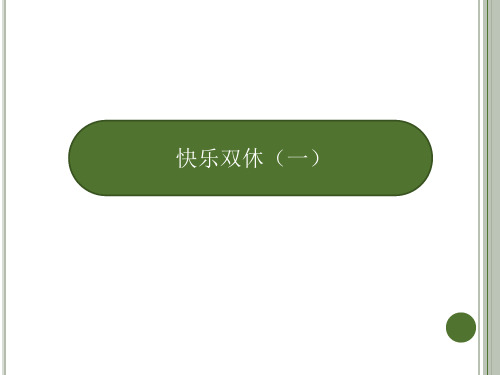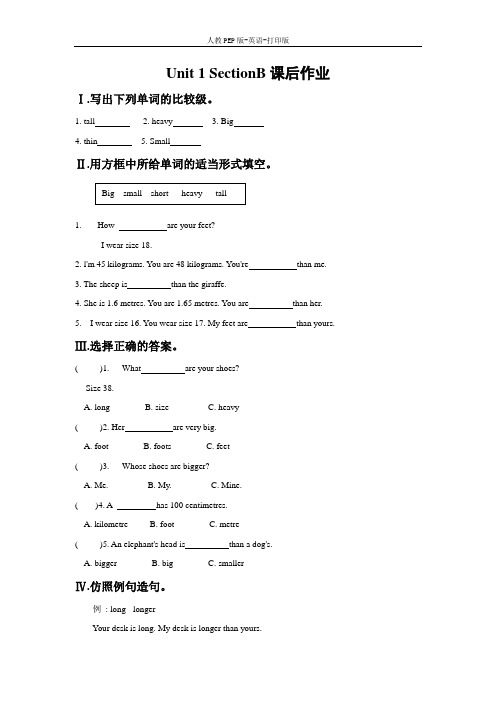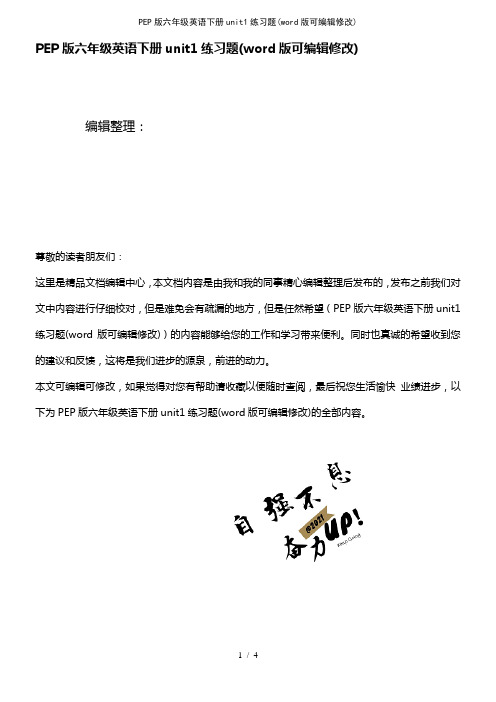最新人教pep版小学六年级下册英语双休作业1
“PEP”2024年11版小学六年级下册第16次英语第1单元暑期作业

“PEP”2024年11版小学六年级下册英语第1单元暑期作业考试时间:100分钟(总分:100)A卷考试人:_________题号一二三四五总分得分一、综合题(共计100题)1、What is the color of grass?A. BlueB. YellowC. GreenD. Brown答案:C2、听力题:The process of freezing occurs when a liquid loses _______.3、听力题:A base can neutralize an _____.4、听力题:The clock ticks ______ (loudly).5、topography) describes the shape and features of land. 填空题:The ____6、听力题:The chemical formula for potassium chloride is __________.7、听力题:A ____ can often be found lounging in the sun.8、填空题:My ________ (玩具名称) can jump high.9、填空题:The ______ (植物的医学用途) is widely acknowledged.10、What do we call the study of matter and energy?A. ChemistryB. PhysicsC. BiologyD. Astronomy答案:B11、听力题:The teacher is _____ the students to listen. (asking)12、听力题:The dog is barking ___. (loudly)13、填空题:The weather is _______ (凉爽的).14、, my __________ (玩具名) can __________ (动词). 填空题:Sometime15、What do we call the area of land that is flooded with water?A. WetlandB. MarshC. SwampD. All of the above答案: D. All of the above16、What do plants need for photosynthesis?A. WaterB. SunlightC. Carbon dioxideD. All of the above答案: D17、填空题:My brother loves __________ (电子游戏).18、What is the name of the famous ancient structure in Egypt?A. ParthenonB. ColosseumC. Great WallD. Pyramids答案:D19、What is the process of removing salt from seawater called?A. DistillationB. FiltrationC. DesalinationD. Evaporation答案: C20、ts bloom only once a ______. (某些植物每年只开一次花。
人教PEP版六年级英语下册测第二单元作业课件-快乐双休一

称赞对方的表达: You're a good boy. 你是个好男孩。。
一、选词填空。
一、选词填空。
1.—What did you do?
—I stayed at home andcleaned my room. 2.Did you do anything else?
3.I played football last weekend.
—It was fine,thanks.
过得不错,谢谢。 询问对方做了什么事:
1.—What did you do?
你们做了什么? —We drank tea in the afternoon and watched TV.
我们下午看了电视ything else? 你还做了别的事吗? —Yes,I cleaned my room and washed my clothes. 是的,我还打扫了房间,洗了衣服。
三、选择合适的选项,完成对话。 Tom:Hello, Jack!
Jack:Hi.1.____ C
Tom:It was fine. Jack:2.____ D Tom:I washed my clothes and cooked dinner.
B Jack:You're helpful!3.____
快乐双休(一)
动词短语过去式 cleaned my room 打扫我的房间
watched TV 看电视
stayed at home 待在家 washed my clothes 洗我的衣服
drank tea 喝茶
询问对方周末过得怎么样:
—How was your weekend? 周末过得怎么样?
Tom:Yes, 4.____ A
新人教版PEP六年级下册英语全册一课一练习题集

新⼈教版PEP六年级下册英语全册⼀课⼀练习题集⼩学英语六年级下册⼀课⼀练训练题Unit 1 How Tall Are You?Period 1⼀、Read and change.写出下列形容词的⽐较级形式.tall---________ short---___________ young--- ___________ old---________ strong---__________⼆、Read and make sentences. 连词成句.1、shorter , you , me , than , are (.)_________________________________________________2、are,how , tall , you(?)_________________________________________________3、how,are,you, old(?)_________________________________________________三、Read and choose . 选词填空.1. You are ___________(strong/stronger)than your brother.2. A dog is ________(shorter/stronger)than a giraffe.3.The man is ________(younger/older)than the boy.4. I’m 145cm _________(taller/tall).5.Tom is _________(tall/taller)than Mike.Period 2⼀、Read and fill.读句⼦,填上所缺的单词。
1、I’m 12 years old. You are 13.I’m_________than you.2、I’m 160cm tall. You are 164cm.You are ______than me.3、I’m taller than you, so you are ________than me.4、You are 163cm tall. I’m 161cm.You’re_______taller than me.5、You are 10years old . I’m 12 .I’m ______years older than you.⼆、Survey your classmates and make a report.调查你的同学并作汇报。
人教PEP版-英语-六年级下册--Unit 1 SectionB 课后作业

Unit 1 SectionB课后作业Ⅰ.写出下列单词的比较级。
1. tall2. heavy3. Big4. thin5. SmallⅡ.用方框中所给单词的适当形式填空。
1. ---- How are your feet?--- I wear size 18.2. l'm 45 kilograms. You are 48 kilograms. You're than me.3. The sheep is than the giraffe.4. She is 1.6 metres. You are 1.65 metres. You are than her.5. I wear size 16. You wear size 17. My feet are than yours. Ⅲ.选择正确的答案。
( )1. --- What are your shoes?--- Size 38.A. longB. sizeC. heavy( )2. Her are very big.A. footB. footsC. feet( )3. --- Whose shoes are bigger?A. Me.B. My.C. Mine.( )4. A has 100 centimetres.A. kilometreB. footC. metre( )5. An elephant's head is than a dog's.A. biggerB. bigC. smallerⅣ.仿照例句造句。
例: long - longerYour desk is long. My desk is longer than yours.1. young --- younger2. small--- smaller3. short ----shorter4. strong----- stronger5. funny ------- funnierⅤ.根据图片和首字母提示,补全短文。
人教PEP版六年级英语下册测第一单元作业课件-快乐双休二

快乐双休(二)
smaller 更小的 stronger 更强壮的 bigger 更大的 thinner 更瘦的 heavier 更重的 goalkeeper 守门员
You're heavier than me.你比我更重。 Your feet are bigger than mine.你的脚比我的脚更大。 询问体重及回答: —How heavy are you? 你有多重? —I'm 52 kilograms. 我重52公斤。 询问鞋子尺码: —What size are your shoes? 你的鞋子是什么尺码? —I wear size 37 shoes./My shoes are size 37.我穿37码的鞋子。
一、写出下列单词的反义词或对应词。
1.long—
2.thinner— 3.s
4.older—
younger
二、根据句意填空。 1.You're taller than me.But your legs are shorter . 2.Mike is 56 kilograms.Chen Jie is 47 kilograms.Chen Jie is thinner than Mike. 3.Year by year, my hands are gettingbigger and bigger . 4.I wear size 37 shoes.She wears size 35 shoes.Her feet are smaller than mine.
三、根据答句,写出问句。 1.— How tall are you?
—I'm 1.62 metres.
2.— How heavy is he? —He's 53 kilograms. 3.— How old is your father? —My father is 38 years old. 4.— How long is your arm? —My arm is 0.52 metres. 5.— What size are your shoes? —I wear size 36 shoes.
PEP版六年级英语下册unit1练习题(K12教育文档)

PEP版六年级英语下册unit1练习题(word版可编辑修改)编辑整理:尊敬的读者朋友们:这里是精品文档编辑中心,本文档内容是由我和我的同事精心编辑整理后发布的,发布之前我们对文中内容进行仔细校对,但是难免会有疏漏的地方,但是任然希望(PEP版六年级英语下册unit1练习题(word版可编辑修改))的内容能够给您的工作和学习带来便利。
同时也真诚的希望收到您的建议和反馈,这将是我们进步的源泉,前进的动力。
本文可编辑可修改,如果觉得对您有帮助请收藏以便随时查阅,最后祝您生活愉快业绩进步,以下为PEP版六年级英语下册unit1练习题(word版可编辑修改)的全部内容。
一、写出下列形容词的比较级形式(20分)big smalllong thintall shortheavy youngold strong二、填空 (20分)1、The red ruler is 20 cm 。
The yellow ruler is 10 cm.The yellow ruler is than the red ruler。
2、I am 160 cm tall。
He is 170 cm tall。
He is than me 。
3 、Zhang Peng is 8 years old 。
Amy is 10 years old.Amy is than Zhang Peng。
、4、Sarah’s mother is 30 years old. John’s father is 40 years old。
Sarah's mother is than John's father.5、Lucy is 30 kg. Lily is 36 kg。
Lily is than Lucy.三、选择题(10分)( )1、I’m 60 kg. I'm soA heavyB heavierC heaviest( ) 2、Tom wears size 18。
pep人教版六年级英语下册unit2《Last weekend 》单元作业练习题附答案
pep人教版六年级英语下册unit2《Last weekend 》单元作业练习题附答案Unit 2: Last XXXPart A - Lesson 11.What did you do last weekend?2.XXX.3.How was your weekend?4.Did you do anything else?5.XXX.1.B2.A3.C4.A5.B1.What did you do last weekend?2.Did you do anything else?1.What did you do last weekend when you cleaned your room?2.How was your weekend?Part A - Lesson 21.Stayed at home2.Cleaned my room3.Watched TV4.XXX1.C2.C3.C1.What did Tom do last night?2.She is watching TV now.3.What is he doing now。
He is XXX.1.Did you cook dinner yesterday evening。
(作肯定回答)Yes。
I did.2.I XXX(对画线部分提问)What did you do last weekend?3.Visited。
my。
weekend。
grandpa。
last。
me (.) (连词成句)I visited my grandpa last weekend.四、判断对错。
Sarah was busy but very happy last Sunday。
She washed her XXX to music in the evening。
Next Sunday。
she is going to the park with her parents.1.Sarah cooked noodles last Sunday。
新人教版PEP六年级英语下册(全册)同步练习随堂练习一课一练
新人教版PEP六年级英语下册(全册)同步练习随堂练习一课一练I’m ________ than you.A。
XXX3.—Who is ________。
Tom or Jim?Jim is taller than Tom.A。
XXX4.—________ is your father?He is 40 years old.A。
How tall。
B。
How old。
C。
How heavy5.I am in Grade ________.A。
six。
B。
seven。
C。
eight补全单词:1.dinosaurs。
2.meteor shower。
3.height。
4.mouth。
5.together。
6.then选出不同类的一项:1.three。
2.eat。
3.how。
4.oldest。
5.look选择题:1.B。
tall。
2.A。
taller。
3.A。
taller。
4.B。
How old。
5.A。
six改写后的文章:本文为《新人教PEP版六年级下册英语全册》Unit 1 PartA的同步练,适合课堂小测、作业布置和知识强化训练。
单词拼写:1.dinosaurs。
2.meteor shower。
3.height。
4.mouth。
5.together。
6.then不同类选项:1.three。
2.eat。
3.how。
4.oldest。
5.look选择题:1.B。
tall。
2.A。
taller。
3.A。
taller。
4.B。
How old。
5.A。
six1.I am taller than Mike。
2.It's taller than both of us。
3.How tall is the dinosaur。
Dialogue:XXX: How old are you。
Bob: I am 13 years old。
XXX: I am 14 years old。
I'm older than you。
人教PEP版六年级英语下册测第一单元作业课件-快乐双休一
4.That's the tallest dinosaur in this hall.(改为否定句)
That isn't the tallest dinosaur in this hall.
快乐双休(一)
taller 更高的 shorter 更矮的;更短的 longer 更长的 younger 更年轻的 older 更年长的
询问对方身高及回答: —How tall are you? 你有多高? —I'm 1.64 metres. 我身高1.64米。 询问对方的年龄: —How old are you? 你多大年纪? —I'm 12 years old. 我12岁。
E.I'm 1.63 metres.
三、按要求完成句子。 1.us tree both than taller of is the (.)(连词成句)
The tree is taller than both of us.
2.My brother is 1.66_metres.(对画线部分提问) How tall is your brother?
( C )2.How old is your sister?
( A )3.How long is the ruler?
( D )4.How much is the book?
( B )5.How many bikes are there?
A.It's 0.2 metres.
B.Seven.
C.She's 9 years old. D.17 yuan.
几者进行比较描述:
It's taller than both of us together. 它比我们俩加起来还高。
人教版英语PEP六年级下册第一单元作业设计
人教版英语PEP六年级下册第一单元作业设计Unit 1 How tall are you?U1-1课堂作业一、写出下列单词的比较级。
1. old ________2. tall _________3. young _________4. long _________5. short _________二、单项选择。
( )1. Miss White is 23 years old. Sarah is 13 years old.Sarah is _________ than Miss White.A. youngB. youngerC. older( )2. I’m 1.64 meters. I’m _________ than you.A. tallerB. longerC. short( )3. 你想知道对方的身高,可以说:_________A. How tall are you?B. How taller are you?C. How old are you?三、将下列的单词宝宝连词成句,并写出汉语。
1. shorter, Mike, is, than, John (.)_____________________________________________()2. than, you, me, are, older(.)_____________________________________________()3. ruler, is, longer, this, than, ruler, that(.)_____________________________________________()U1-2课堂作业一、将下列打乱的字母重新组合成新的单词,然后写出汉语。
1. o, y, u, g, n, r, e2. s, o, h, t, r, r, e3. e, r, l, o, d,______________ ______________ ______________( ) ( ) ( )二、单项选择。
- 1、下载文档前请自行甄别文档内容的完整性,平台不提供额外的编辑、内容补充、找答案等附加服务。
- 2、"仅部分预览"的文档,不可在线预览部分如存在完整性等问题,可反馈申请退款(可完整预览的文档不适用该条件!)。
- 3、如文档侵犯您的权益,请联系客服反馈,我们会尽快为您处理(人工客服工作时间:9:00-18:30)。
双休作业一
Ⅰ.Think and write.(想一想,根据示例写出尽可能多的组合)
例: long→longer→longest
→→→→→→→→→→→→...
Ⅱ.Look,read and write.(看图,补全句子)
1.The football is than the basketball. The basketball is than the football.
2.The man is than the woman. The woman is
than the man.
3.Tony is than Tim. Tim is than Tony.
4.John is than Peter. Peter is than John.
Ⅲ.Read and choose.(读句子,选词填空)
1.Some dinosaurs are (big/bigger) than houses.
2.I’m 1.60 metres (tall/high).
3.What size (is/are) your shoes?
4.That dinosaur is (taller/the tallest) in this hall.
5.It’s (taller/the tallest) than both of us together.
6.You are older and (smarter/smartest) than me.
7.The sun is (getting/get) brighter and brighter.
Ⅳ.Choose the best answer.(选择最佳答案)
()1.Little Duck is watching the sun down.
A.goes
B.go
C.to go
()2.My mother is shorter and than my father.
A.thin
B.strong
C.thinner
()3.—How is the basketball player?
—He’s 2.26 metres.
A.tall
B.high
C.taller
()4.—My legs are than .
—Yes, and you are taller than me.
A.long; yours
B.longer; your
C.longer; yours
()5.— are your shoes, Sarah?
—My shoes are size 36.
A.How big
B.What size
C.How tall
Ⅴ.Read and choose.(根据句意选择合适的图片)
()1.Which animal is heavier, the elephant or the monkey? ()2.Mr Li is older. Who is Mr Li?
()3.My brother is stronger. Which boy is my brother? ()4.Whose neck(脖子) is longer?
()5.I’m thinner than my mother. Who is my mother?
Ⅵ.Read and choose.(选择合适的句子补全对话)
Mike: Hello, John. How are you?
John: 1. Thank you.
Mike: You’re strong. 2.
John: I’m 49 kilograms.
Mike: You are heavier than me. I’m 48 kilograms. 3.
John: I wear size 39 shoes. How about you?
“√”,错的画“×”)
Hello, I’m a Chinese boy. My name is Mingming. I’m 12 years old. I’m 1.60 metres tall and I’m 45 kilograms. I like drawing pictures. Every morning, I go to school with my good friend Dongdong. We go on foot. Dongdong is 11 years old. He’s 2 kilograms heavier than me. But I’m 0.03 metres taller than him. We study in Hongqi Primary School. Lingling is my sister. We’re in the same(相同的) school. She’s one year older than me. She likes sports. She is taller and stronger than me. We three often play together after school.
()1.Mingming is older than Dongdong.
()2.Mingming is 1.63 metres tall.
()3.Lingling is 2 years older than Dongdong.
()4.Dongdong is 2 kilograms heavier than Mingming.
()5.Lingling is stronger and taller than Mingming.
Ⅷ.Writing practice.(小作文)
春天来了, 万物复苏, 很多事物都发生了变化: 天空更晴朗了, 天气变暖了, 树叶越来越绿了, 河水也更清澈了……请根据你的观察, 写一写这些变化吧! 不少于60词。
双休作业一
Ⅰ.略
Ⅱ.1.smaller; bigger2.older; younger3.stronger; thinner4.shorter; taller
Ⅲ.1.bigger2.tall3.are4.the tallest5.taller6.smarter7.getting
Ⅳ.1.B2.C3.A4.C5.B
Ⅴ.1.A2.B3.A4.B5.A
Ⅵ.1.C2.A3.D4.B
Ⅶ.1.√2.×3.√4.√5.√
Ⅷ.Spring is coming. It’s getting warmer and warmer. The sky is clearer. The sun is brighter. Leaves become greener. Rivers and lakes get cleaner. Old people are happier because they can enjoy the sun in the open air. Young people can go hiking and enjoy the beautiful season. We all like spring very much.。
